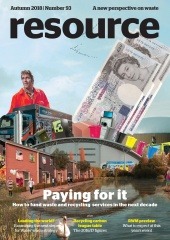The Insider: So much for quality
The Chinese ban on low-quality secondary materials seems to have gone off with more of a whimper than a bang in UK markets, at least for the moment. Global outlets prepared to pick up low-quality material at bargain basement prices have averted crisis and relieved pressure on UK recycling systems.
Industry commentators, your writer amongst them, had forecast dire consequences with stockpiling of unsaleable material, a spate of fires, littering, fly tipping, fractured relationships and broken contracts. Hitherto, the most promising thing to emerge from the potential chaos seems to be a broad acknowledgement of a need to improve secondary material quality, but there is still no imperative because there remains a global market for rubbish (quite literally).
In the paper and plastics industries particularly, hands were rubbed at the thought that, finally, waste managers and local authorities would acknowledge the need to attend to quality and that this might in turn lead to a change in collection methods and measures to ensure the production of material that any reprocessor could use anywhere in the world.
Those collectors who were already achieving a quality output – by responding to market and moral pressure to manage their dry recyclate stream responsibly, minimising contamination through source separation – had a right to feel secure in the knowledge that, whatever happened in turbulent markets, their material would get preferential treatment in price and off-take.
 This article was taken from Issue 93
This article was taken from Issue 93Imagine, therefore, the dismay and irritation of some paper collectors who found that, regardless of the collection methods they had adopted and the quality they were making, buyers took no account as the price of mixed papers tumbled to just above zero or less. This came even as the price of containerboard (the paper that post domestic mixed papers is often used to make) continued on an upward trajectory. Manufacturers benefitted while the supply chain sweated. Some local authority collectors felt they had a right to expect better from an industry trumpeting the need for quality, but attaching no value to it when push came to shove!
As reprocessing industries make their case to government and other stakeholders for changes to collection and sorting systems to achieve higher quality recyclate, so they need to step up to support and encourage those who are striving to achieve it. An industry that places no monetary value on its raw material, nor on relationships with its supply base should not be surprised if in turn, it pays little attention to the needs of the industry. Why should a recycler care about quality if it brings no reasonable return, or even a guarantee of an outlet when times get tough?
Buyers need to value quality in the price they pay, with a clear differentiation between good and bad. Recent developments in OCC (cardboard) prices into
the Chinese market suggest this could happen. The market needs to encourage good practice by placing positive value on good quality raw material, reinforce good behaviours and show loyalty to those trying to achieve better outcomes. Regardless of the exigencies of the market, ways must be found to build structures and sustain trust within the supply chain. Without it there can be no reliable investment in future collection systems or in better quality and we will always face a race to the bottom, both in price and quality.






